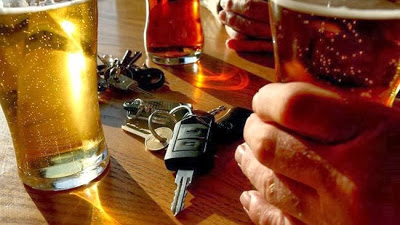 Christmas is supposedly the most wonderful time of the year. The sleigh bells are ringing. The carollers are singing. And the pint pots are clinging. But whilst hundreds of people across the country enjoy a few Yuletide tipples, the journey home could potentially be life-changing.
Christmas is supposedly the most wonderful time of the year. The sleigh bells are ringing. The carollers are singing. And the pint pots are clinging. But whilst hundreds of people across the country enjoy a few Yuletide tipples, the journey home could potentially be life-changing.
The festive period is one of the most prolific times for drink drivers, with young drivers being the most vulnerable. Last year alone 290 people were killed in alcohol related accidents, up a quarter on 2011, whilst the number of accidents stood at 6,680.
The beginning of December marked the start of campaigns across the country in a bid to crack down on alcohol related road accidents, and THINK!’s winter campaign aims to make drivers aware of the possible aftereffect driving over the limit could have.
Transport Minister Robert Goodwill, who recently launched ‘The Snowball Effect’ said, “Just one drink can put you over the limit and the consequences are devastating – not only will you be cuffed and put in a cell, but if you’re convicted you will lose your licence and, as [Snowball Effect] research shows, you could even lose your job.”
One in three people convicted of drink driving lose their jobs and suffer dramatic changes in lifestyle, whilst up to one million citizens in the UK could be at risk as a result of one too many over the Christmas period.
Professions in sectors such as teaching, health and social care, and finance are vulnerable, and with over half of drivers not knowing when it is safe to drive in the morning, there are hundreds gambling their own and other people’s lives.
Police figures show that in 2011 more drivers failed breath tests between 6am and 11am than the hour before or after midnight, and research carried out by Click On Tyres shows that just 5 bottles of lager will take at least 11 hours to wear off.
It is a surprising fact for many who believe a bottle of wine at 10-11pm will have no repercussions the following morning, but figures show you would need to wait until 1pm the next day before being fit to get back behind the wheel.
The effects alcohol has on your body can last for a considerable amount of time. It has been shown that just 2 units can slow your reaction time by 0.2 seconds, and your concentration can be hugely affected by only a small amount of drink.
As Christmas draws in, police up and down the country are already catching irresponsible drivers. The authorities in Yorkshire began their campaign to protect road safety at the very beginning of the month and in under a week, 20 people, in North Yorkshire alone, had been arrested on suspicion of the offence.
Every week around 11 people are killed by drink drivers, in addition to around 80 deaths caused by drivers who are under the limit but have some alcohol in their bloodstream. And knowing your limits comes as part of the problem.
In truth, there is no real way you can assess if you’re over the limit. The limit in the UK is 80 milligrams of alcohol per 100 milliliters of blood but there is no fool-proof way of staying under the limit. Factors such as weight, gender, metabolism and even stress levels will play a part in how you process alcohol whilst younger people tend to take longer to become fit to drive again.
In the UK, accidents are slightly down compared to previous years. But with over 6,500 accidents on the roads, it’s still too many for an offence that could carry up to 14 years imprisonment. Death by dangerous driving whilst under the influence of alcohol could land you in prison for over 10 years with an unlimited fine and other offences could see up to 12 months’ imprisonment and a £5,000 fine as well as other consequences, which can seriously affect the rest of your life.
Roger Singer, Head of Drink Driver Education spoke as part of The Snowball Effect. He said, “I help hundreds of drink drivers every year, and they all say the impact of their conviction is much more severe and far-reaching than they imagined.
“Everyone I meet has been given at least a 12-month driving ban. For many this meant instant dismissal from their jobs, for some it meant resigning because they couldn’t get to work. Many haven’t applied for future roles they want because of the conviction and have got stuck in careers they hate.”
And it’s a problem that can be easily avoided. Nobody wants a police officer knocking on their door this month, and with local councils across the country doing all they can to put on extra public transport, there is really now excuses as to why Christmas can’t be the most wonderful time of the year.

